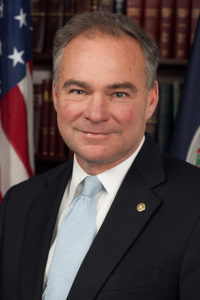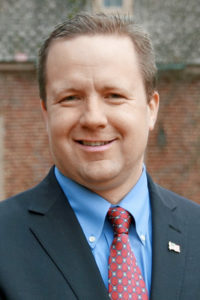
In the race to represent the Commonwealth of Virginia in the United States Senate, incumbent Senator Tim Kaine (D-VA) is challenged by Prince William County Board Chairman Corey Stewart (R) and Matt Waters (L). Kaine was first elected to the Senate in 2012 and is serving his first term. He had previously served one term as Governor of the Commonwealth of Virginia.
Each of the fifty states have two seats in the Senate, for a total of one hundred seats. There is no representation, voting or non-voting, for U.S. territories or the District of Columbia. Senators serve six-year terms, and elections are held on a staggered schedule with roughly one-third of the Senate up for election every two years. This year, thirty-three seats are in contention, with an additional two up for special elections.
The Republican Party currently holds a 51-47 majority over the Democratic Party in the Senate. Two seats are held by independents who caucus with the Democratic Party, giving the Democrats an effective 49-seat minority. Currently, both of Virginia’s Senate seats are held by Democrats.
Incumbent: Tim Kaine (D)

Incumbent Senator Tim Kaine (D-VA) is nearing the end of his first term representing Virginia in the Senate. He is seeking reelection.
Kaine served as Mayor of Richmond, Virginia, from 1998 to 2001. In 2001, he was narrowly elected Lieutenant Governor of Virginia in the same election that sent Governor Mark Warner (D-VA) to the state house. Virginia’s constitution prohibits governors from serving multiple consecutive terms, so Kaine became Warner’s hand-picked successor, and was elected Governor of Virginia by a comfortable margin in 2005. Kaine went on to become the Chairman of the Democratic National Committee in 2009, while he was still governor, and remained in that role until 2011.
In 2012, Kaine was elected to the U.S. Senate, comfortably defeating former Senator George Allen (R-VA). In 2016, he stood as the Democratic Party nominee for Vice President, sharing the ticket with former Secretary of State Hillary Clinton (D), who lost the election to incumbent President Donald Trump (R).
Kaine was an effective and accomplished mayor in Richmond, but his record as governor was quite different. Kaine’s tenure was marked by partisan bickering between him and the Republican-controlled General Assembly. Although he spearheaded efforts to digitize Civil War records and bolster the Virginia coal industry, he also supported the state’s idiotic new set of toll roads and mindless increases in state government spending. When he left office, Kaine left his successor with a whopping $2.2 billion shortfall.
In the Senate, Kaine has become even more of a Democratic partisan. This has been a transparent effort to ingratiate himself with the national party, which continues to shift further and further off to the left. Clinton’s choice of Kaine for her running mate only rewarded and reinforced this poor behavior. Kaine seems to have forgotten that he works for Virginians, not for the Democratic National Committee.
Kaine refused to work with the Republican majority to repeal and replace the Affordable Care Act, colloquially known as ‘ObamaCare,’ and seems content to let working Virginians continue to pay more and more for our health insurance while getting less and less in return. He refused to support last year’s tax reform bill, which has put more money in our pockets and helped kick-off a full-fledged economic recovery. He refuses to support efforts to crack down on illegal immigration, which brings property and gang crime with it.
Worse, Kaine, like many of his Senate colleagues in both parties, has contributed to the hyper-partisan atmosphere regarding court nominations, especially those to the Supreme Court of the United States. He could be forgiven for voting against the nomination of Associate Justice Brett Kavanaugh given the firestorm that erupted around him—despite the complete lack of any evidence for the claims against him—but Kaine also voted against Associate Justice Neil Gorsuch, who was eminently qualified and largely uncontroversial.
Turning to human rights, Kaine once deserved some credit for occasionally bucking the party line. Typical of Virginia Democrats up ‘til recently, he was less hostile to the right to keep and bear arms than many of his party colleagues. He also broke with the Obama administration’s repeated religious liberty violations. But these small points of light seem to have disappeared in the wake of Kaine’s involvement with the Clinton presidential campaign. He is now largely in lockstep with his party’s radicalization, and proudly so.
Kaine has always been opposed to the right to life, the most fundamental right upon which all others are predicated, although he has sometimes claimed that he personally opposes abortion but will not impose that belief on others. This is nonsense; government has a valid interest in outlawing murder. Now, he also stands consistently in opposition to the right to keep and bear arms, religious liberty, and other fundamental rights.
Corey Stewart (R)

Prince William County Board Chairman Corey Stewart (R) stands as the Republican Party nominee to represent Virginia in the U.S. Senate.
Stewart, an attorney, served as the Occoquan District representative on the Prince William County Board of Supervisors from 2003 to 2006. He was then elected at-large chairman of the same board following a special election in 2006. He was reelected in general elections in 2007, 2011, and 2015, and is currently in his third full term.
In 2013, Stewart unsuccessfully sought the Republican Party nomination for Lieutenant Governor of Virginia. He served as the state campaign chair for Donald Trump’s (R) 2016 presidential campaign, but was dismissed from that role for participating in a protest outside the offices of the Republican National Committee. Stewart unsuccessfully sought the party nomination for Governor of Virginia in 2017.
On its own, Stewart’s record on the Prince William County Board of Supervisors is impressive. He has ruthlessly slashed taxes without sacrificing important county services, and has maintained the county’s strong AAA bond rating. His most controversial initiative—a major crackdown on illegal immigration—has been a resounding success, contributing to noteworthy reductions in the county’s crime rates. He promises to continue his work in these areas if elected to the senate.
Stewart is also a strong supporter of human rights. He has consistently defended the right to life, the right to keep and bear arms, free speech, and the freedom of religion. He promises to continue doing so if elected to the Senate. Perhaps most notably, he is a strong supporter of national reciprocity for concealed handgun permits. Although a good argument can be made that these permits are unconstitutional in the first place, it is appropriate for the federal government to require that states recognize each other’s permits under the U.S. Constitution’s Full Faith and Credit clause.
Though very strong in these key areas, Stewart has shown surprisingly poor and erratic judgement in his political campaigns. He made the irrelevant issue of Confederate statues the centerpiece of his losing campaign for the Republican gubernatorial nomination in 2017. More recently, he gave loud public support to disgraced Alabama Supreme Court Justice Roy Moore in his special election campaign for the U.S. Senate . . . support that didn’t help Moore, and certainly didn’t help Stewart.
Stewart considers himself a Trump-like figure and seems to subscribe to the “all press is good press” school of thinking. But Trump did not win Virginia. The voters in the commonwealth tend to favor civility, statesmanship, and steady leadership. Stewart’s no-holds-barred campaigning reflects poorly on him, and undermines his political accomplishments in Prince William County.
Matt Waters (L)

Matt Waters (L), a campaign and non-profit fund raiser, stands as the Libertarian Party nominee to represent Virginia in the U.S. Senate.
Waters holds a bachelor’s degree from George Mason University, and is currently working toward completing a master’s degree. For more than twenty years, he has worked to raise funds for political candidates, ballot initiatives, and non-profit organizations. He currently serves as the development director for Students for Liberty.
On most issues, Waters takes typical Libertarian positions, many of which are appealing to fiscal conservatives and strict constitutionalists like myself. He believes that the fundamental unit of society is the individual. Accordingly, he is a strong supporter of individual human rights, limited government, and the free market.
Waters promises that, if elected, he would work to enact a federal spending freeze, defund or privatize unnecessary federal agencies, and generally get the government out of everybody’s business. He seeks to implement the “Fair Tax,” a plan that would replace the federal income tax with a simple national sales tax, and reform our monetary system by eventually phasing-out the Federal Reserve.
He does take the typical Libertarian Pollyanna position on international relations and the use of military force, a view that is perhaps right in principle, but unachievable in practice until international bodies like the United Nations begin to step-up in defense of freedom and self-determination around the world.
But in some other key areas where the Libertarian Party is badly misguided, Waters breaks with them and takes a more logical position. Regarding illegal immigration, he supports the E-Verify system for verifying legal status before hiring, and he advocates a mostly merit-based immigration system. Most Libertarians seem to support a radical, anarchistic open-borders policy. Waters, who does support some important immigration reforms, also understands the importance of border security and the rule of law.
The most impressive thing about Waters is that he is one of the minority of Libertarians who acknowledge that the right to life is the first and foremost of human rights. I am constantly disappointed by Libertarian defenses of so-called “abortion rights,” because all the rights that Libertarians rightfully and consistently defend—freedom of speech, freedom or religion, the right to keep and bear arms, protection from unreasonable searches and seizures, and more—mean nothing if the first and most important right is not protected. And human rights begin when human life begins.
This means that Waters is consistent about human rights in a way that most Libertarians aren’t . . . and one of the main reasons I tend not to vote Libertarian does not apply here.
Conclusion
Senator Tim Kaine (D) has been an embarrassment. On nearly every major piece of legislation to come before him, he has voted more in-line with the interests of the increasingly radical Democratic National Committee than with the interests of the people of the Commonwealth of Virginia.
Kaine has failed to support efforts to reform “ObamaCare” and reduce our health care costs, failed to support efforts to reduce our tax burden, failed to support President Donald Trump’s (R) qualified and experienced Supreme Court nominees, and has consistently taken positions opposed to human rights—the right to life, the freedom of religion, the right to keep and bear arms, and more.
Prince William County Board Chairman Corey Stewart (R) takes many of the right positions on paper, and has an impressive record leading Prince William County, Virginia, but he has repeatedly shown poor judgement and has tried to adopt some of Trump’s worst traits in a state that understandably (but wrongly) voted for former Secretary of State Hillary Clinton (D) instead.
Contrary to the doomsayers, Virginia is not irreparably a “blue” Democratic state now. Many Virginians are still sympathetic to Republican Party positions and causes. But if Republicans ever want to retake Virginia, they need to stop putting forth candidates who are either tepid centrists (like, say, Ed Gillespie) or obnoxious blowhards (like Stewart). There are plenty of likable, conservative Virginians out there . . . but when was the last time one appeared on a statewide ballot?
Normally, this is where I might reluctantly encourage a vote for Stewart anyway because he is the lesser of two evils. And he may be. But there is a third choice on the ballot.
Matt Waters (L) holds to all the Libertarian Party’s laudable positions, while breaking with the party in two of the three areas where it is typically wrong. Unlike most Libertarians, Waters understands the importance of border enforcement and the rule of law regarding immigration. More importantly, he understands and defends the first human right, the right to life. Only his position on foreign relations and the use of military force give me pause, but this is a relatively small complaint.
I endorse the election of Matt Waters (L) to represent Virginia in the U.S. Senate.
